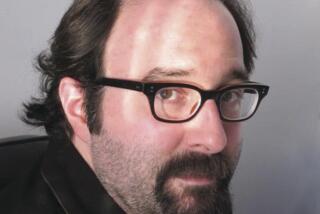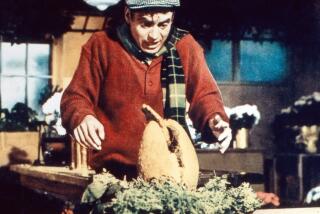THE ‘80s A Special Report :...
If one film director captured the jagged edges of the 1980’s, it was Oliver Stone. A graduate of both Vietnam and film school, he found himself in perfect sync with an overheated decade fueled by self-absorbed cynicism, a rampaging media and an unabashed lust for a buck.
Even though Stone didn’t hit his stride till mid-decade, his films, from “Salvador” and “Platoon” through “Wall Street” and “Talk Radio” have all plumbed the depths of the ‘80s self-dramatization and despair. Taking their cues from front-page headlines, Stone’s moody, tumultuous films walk the thin line between outrage and outrageousness. “Salvador” sneered at Reagan-era Central American jingoism. “Wall Street” reveled in yuppie greed and power lust. “Talk Radio” offered a dark, nihilistic celebration of our fanatical obsession with celebrity. With his new film, “Born on the Fourth of July,” Stone returns to his touchstone--Vietnam--which produced his biggest hit, “Platoon,” and established his voice as a film maker always eager to explore the darkest recesses of our gaudy popular culture.
Despite its blockbuster mentality, 1980’s Hollywood somehow made room for other gifted movie makers. Woody Allen was more prolific than ever. And despite some failed attempts at more serious statements, America’s most distinctive comic voice produced a wealth of film wonders, exploring showbiz memories (“Broadway Danny Rose” and “Radio Days”), delighting in cinematic trickery (“Zelig” and “Purple Rose of Cairo”) and creating memorable new characters (“Hannah & Her Sisters” and “Crimes and Misdemeanors”). Another holdover from the ‘70s, Martin Scorsese, was still in peak form, mesmirizing us with his syncopated cinematic rhythms and raw, pulp power. Teamed with Robert De Niro, he began the decade with two abrasive but intoxicating knock-out punches--”Raging Bull” and “King of Comedy”--and returned to form at decade’s end with “The Last Temptation of Christ,” another fascinating Scorsese meditation on faith and fevered dreams.
Hollywood’s mainstream wasn’t in such bad shape either, especially with a steady diet of films from such talented craftsmen as Barry Levinson, Sidney Pollack, Lawrence Kasdan and the erratic (but always compelling) Brian de Palma.
If the decade had an unsung--or at least underrated--director, it would probably be Robert Zemeckis.
A Spielberg protege, Zemeckis is now on a par with his mentor, concocting cheeky, hyperactive comic-fables (“Who Framed Roger Rabbit,” “Romancing the Stone” and the “Back to the Future” series) which have all been enormous box-office hits--and escapist delights. Best of all, the late 80’s spawned a string of Young Turks--art-house wizard Jim Jarmusch, outspoken activist Spike Lee and dreamy visionary Tim Burton--who have already esablished themselves as major cinema contenders for the ‘90s.
The Taste Makers project was edited by David Fox, assistant Sunday Calendar editor.
More to Read
Only good movies
Get the Indie Focus newsletter, Mark Olsen's weekly guide to the world of cinema.
You may occasionally receive promotional content from the Los Angeles Times.










